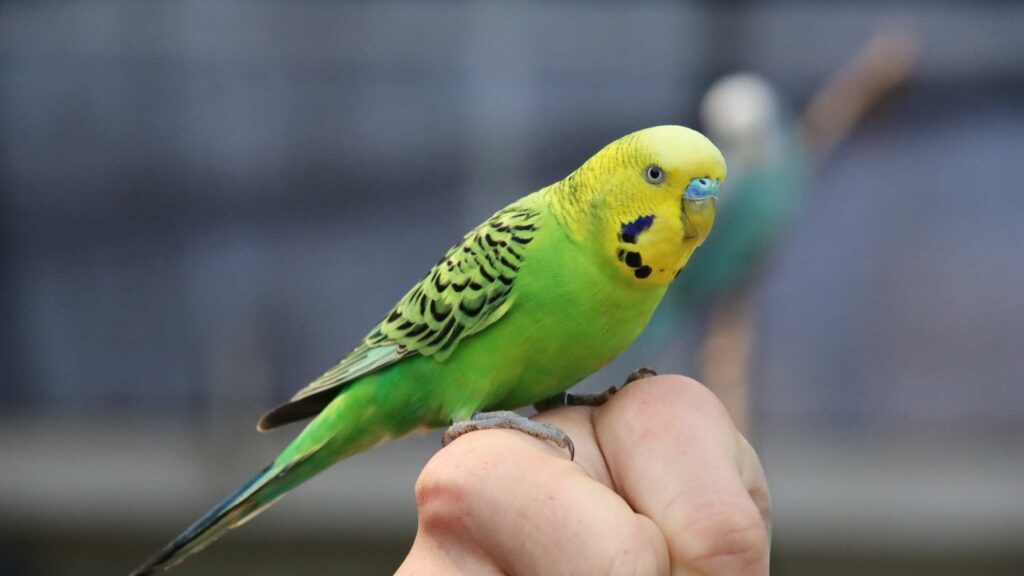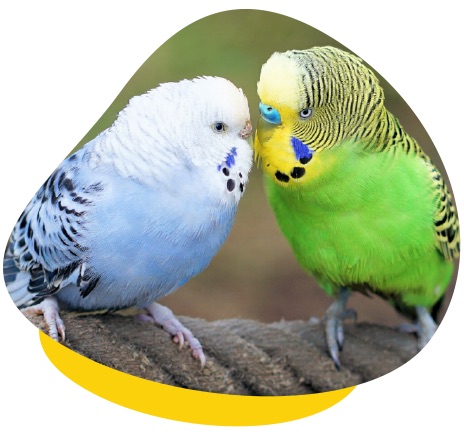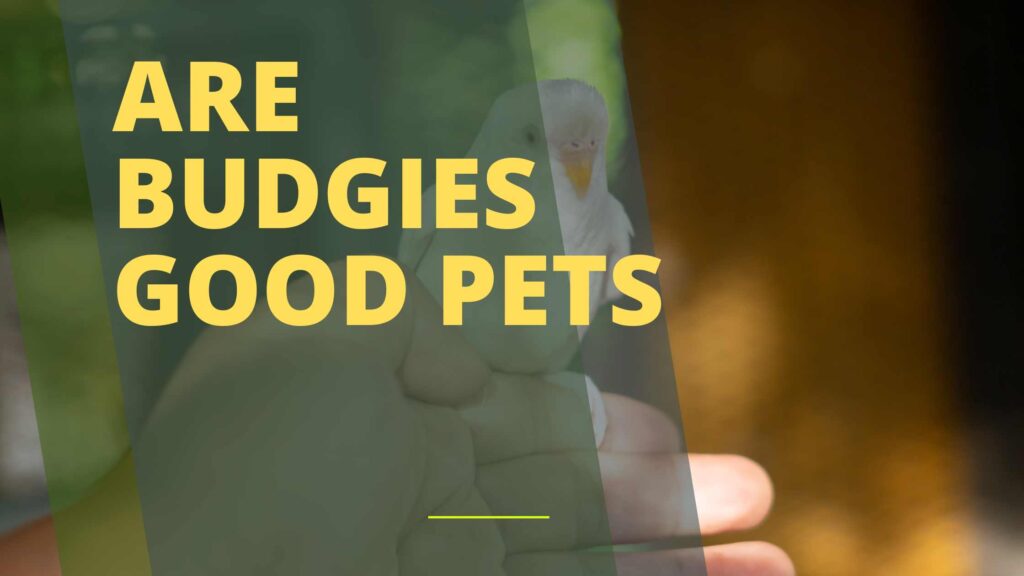Budgies make excellent pets due to their friendly nature and ease of care. They are personable, intelligent, and enjoy human interaction.
Are Budgies Good Pets? Budgies, also known as parakeets, are a top choice for a family pet, embracing companionship and a splash of vibrant color to your home. Social and playful, these birds thrive on interaction, whether it’s with their human families or feathered friends.
With their manageable size and melodic chirping, budgies fit well into various living situations, from apartments to houses. They require a moderate level of care and enjoy a diet of seeds, vegetables, and fruits, making them perfect for first-time bird owners. Their ability to mimic human speech and perform simple tricks adds an engaging dynamic to their pet appeal. Appropriately cared for, budgies can live up to 10-15 years, becoming a long-term companion for those who invest time in their wellbeing. Choose a budgie if you’re looking for a pet that’s both interactive and relatively low maintenance.

Introduction To Budgies As Pets
Budgerigars, affectionately known as budgies, are vibrant little parrots with personalities as colorful as their feathers. Recognized for their friendliness and intelligence, they’ve captured the hearts of pet lovers worldwide. Ideal for families, singles, and seniors alike, budgies make for perfect companions with their charming dispositions and playful natures. This introduction sets the stage for why these birds are loved as pets and may be perfect for your home.
Origins And Popularity
Budgies hail from the arDown Under landscapes of Australia, where they thrive in vast, open spaces flying in large flocks. Since their domestication in the 19th century, these parakeets have soared in popularity, becoming the house pet of choice for many bird enthusiasts. They rank as one of the most popular pets in the world, bringing a slice of Australian beauty into homes globally.
Budgies In Home Settings
Adapting a budgie to your home is a joy. These birds thrive on interaction and enjoy a consistent routine. Offering a variety of toys and regular out-of-cage time can keep your feathered friend happy and healthy. In terms of housing, a spacious cage with ample perches and a clean environment is crucial. Budgies form strong bonds with their owners and can even learn to mimic words and tunes with patience and practice.
| Budgie Care Aspect | Details |
|---|---|
| Diet | Varied mix of seeds, fresh vegetables, and occasional fruits. |
| Exercise | Daily playtime and human interaction. |
| Living Space | Large cage with room to fly and explore. |
| Social Needs | Companionship, either human or a fellow budgie. |
Choosing A Budgie
Welcome to the delightful journey of becoming a budgie owner. These vibrant, chirpy companions make amazing friends. Their joyful demeanor can brighten any home. But, before you bring one of these feathered friends home, taking the right steps in selecting a budgie is crucial for a harmonious match.
Selecting A Healthy Bird
It’s essential to start on the right foot with a healthy budgie. You need to observe the birds carefully. Look for lively, active birds with bright eyes, clean feathers, and full, round chests. Steer clear of birds with puffy feathers, crusts around eyes or beak, and those sitting quietly with closed eyes. These may be illness signs.
Inspect the living conditions too. Clean cages and ample space suggest well-cared-for budgies. Never hesitate to ask the seller or breeder questions about the birds’ health history and care.
Personality And Color Varieties
Budgies win hearts not just with their colors but also with their personalities. These birds boast a spectrum of personalities, ranging from outgoing and playful to gentle and reserved. Spend time with them to sense their individuality.
| Personality Type | Features |
|---|---|
| Playful | Enjoys interactions, toys, and games |
| Reserved | Prefers calm environments, less hands-on |
As for colors, budgies come in a rainbow of options. From the classic green and yellow to blues, whites, and even unique patterns. Choose a color or pattern that you love, but remember, a budgie’s personality shines brightest.
- Classic Green: Vibrant and common
- Blues and Whites: Striking and a bit rarer
- Unique Patterns: Spots, stripes, and more
Habitat Requirements
Creating the perfect home for your budgie ensures happiness and health. Budgies need a comfortable habitat tailored to mimic their natural environment.
Cage Size And Placement
A spacious cage allows budgies to fly and exercise. The ideal cage size is at least 18x18x24 inches for a single budgie. Multiple budgies require a larger space. Ensure horizontal bars for climbing, and a safe, non-toxic paint.
Place the cage in a living area with natural light, avoiding direct sunlight and drafts. It’s essential to keep the cage at eye level in a quiet corner to offer a sense of safety.
Essential Accessories
Your budgie’s cage should feel like a home. Include these accessories:
- Perches: Provide various sizes to exercise their feet.
- Food and water dishes: Stable and easy to clean.
- Toys: Mirrors, bells, and chewables offer stimulation.
Remember, a clean cage prevents diseases. Clean it weekly. Use safe disinfectants and rinse well.
Keeping your budgie’s habitat requirements in check creates a stimulating environment that’s close to their natural wild settings. It is the key to a happy and active pet.
Diet And Nutrition
Understanding diet and nutrition is crucial for a budgie’s health. A well-fed budgie can live a longer, happier life. Let’s delve into how to feed these chirpy birds for optimum health.
Balanced Diet For Budgies
A budgie’s diet should mimic what they eat in the wild. This includes a variety of foods:
- Seeds: A staple, but only part of the diet.
- Pellets: Formulated feeds that provide balanced nutrition.
- Fresh vegetables: Leafy greens like kale and spinach are excellent.
- Fruits: Offer them – in moderation due to sugar content.
Additionally, fresh water is essential daily. Offer a mix of seeds and pellets daily. Vegetables and fruits should be given a few times a week.
Foods To Avoid
Some foods can harm budgies. Ensure these are never in their diet:
| Food Type | Reason to Avoid |
|---|---|
| Avocado | Toxic to birds |
| Chocolate | Can cause poisoning |
| Caffeine | Stimulants are harmful |
| Alcohol | Dangerous and can be lethal |
Also, avoid foods rich in fat and sugar. Always research before introducing new foods to your budgie’s diet.
Behavior And Social Interaction
Are you wondering if budgies make good pets? Let’s dive into the world of these small, colorful parrots to understand their behavior and social needs. Budgies, also known as parakeets, boast a range of lively behaviors and require social interaction to thrive. Knowing what to expect from these feathered friends is key to creating a happy environment for them.
Understanding Budgie Behavior
Observing a budgie’s behavior gives insights into its health and happiness. These birds are active, playful, and filled with personality. They often chirp, sing, and can even learn to mimic words. When content, a budgie will fluff its feathers and gently bob its head. Be alert for signs of stress or sickness, such as reduced chirping, feather plucking, or changes in eating habits.
- Chirping and Singing: Happy budgies are vocal.
- Head Bobbing: A sign of a relaxed and social bird.
- Feather Fluffing: Shows contentment but can also indicate illness if excessive.
Social Needs And Companionship
Budgies are social creatures by nature. They form strong bonds with their owners and other birds. When kept alone, they need daily interaction with humans to stay happy. If you’re away often, consider getting a second budgie for companionship. A single bird can develop behavioral issues from loneliness, such as feather plucking or aggression.
| Budgie Need | Why It’s Important |
|---|---|
| Companionship | Prevents loneliness and boredom. |
| Interaction | Keeps their mind active, encourages bonding. |
| Exercise | Important for physical health and mental well-being. |
Pairing budgies can lead to lovely friendships. They preen each other, share food, and communicate with a unique language. Always introduce new birds slowly to ensure they get along. Social interaction is vital, but so is personal space. Provide a large cage with multiple perches and toys for mental stimulation.
Health And Wellness
When thinking about pet birds, many people imagine the colorful and charming budgie. Known for their vibrant personalities and playful antics. Budgies can indeed be delightful companions. But like all pets, they require proper care to stay healthy and happy. A focus on health and wellness is key to enjoying life with these feathered friends.
Common Health Issues
Budgies, like all birds, can face health problems. It’s important to know what can affect your pet. Here is a list:
- Respiratory Infections: Signs include sneezing and nasal discharge.
- Psittacosis: Also known as parrot fever; it’s a serious condition.
- Mites and Parasites: They cause skin and feather issues.
- Liver Disease: Often due to a high-fat diet; the bird might appear fluffed up.
Other issues include obesity, feather plucking, and nutritional deficiencies. Responsible pet owners must watch for these signs to keep their budgies healthy.
Regular Health Checks And Vet Visits
Budgies need routine check-ups. Regular vet visits ensure your budgie stays healthy. Here’s what you should do:
- Set up annual health exams with a vet who specializes in birds.
- Get immediate care if you notice changes in behavior or appearance.
- Maintain health records, including any treatments or vaccinations.
Preventative care is the best medicine! Find a vet comfortable with birds and stick to a check-up schedule.
| Checkup Item | Frequency | Importance |
|---|---|---|
| Physical Examination | Yearly | Crucial for overall health |
| Weight Check | Every Visit | Prevents obesity |
| Parasite Screening | As Advised | Keeps bird mite-free |
| Blood Tests | Annually | Uncovers hidden issues |
Bird owners must commit to their budgie’s health. Your bird will thank you with chirps and songs of joy!
Training And Taming
Budgies win hearts with their playful nature and chatter. Known for their ease of training, they can create strong bonds with owners. Taming a budgie sets the foundation for a rewarding relationship. It involves patience, consistency, and gentle handling.
Steps For Taming Your Budgie
Begin with these simple steps:
- Create a calm environment. Keep the bird’s cage in a peaceful area.
- Speak softly to your budgie. This helps the bird get used to your voice.
- Spend time near the cage each day. It allows your budgie to observe you.
- Offer treats from your hand. It builds trust with your feathered friend.
- Gently encourage the bird to perch on your finger. Use millet or a favorite snack as a lure.
- Be patient and repeat daily. Trust grows over time.
Remember, every budgie has its timeline. Respect their comfort level while gently nudging them toward taming.
Teaching Tricks And Commands
Budgies can learn various tricks and commands. Use these pointers:
- Start with basic commands like ‘step up’ onto your finger.
- Use clear, consistent words for each trick.
- Reward with treats and praise to reinforce learning.
- Keep sessions short and fun. Five to ten minutes at a time prevents stress.
- Build on mastered tricks to maintain interest.
- Practise regularly, but avoid overworking your budgie.
Taught with love and repetition, a trained budgie can perform impressive tricks. From waving to playing with toys, they show great intelligence and eagerness to interact.
Successful training deepens the human-budgie bond and leads to a happier, more fulfilling pet relationship.
Budgie Lifespan And Care Commitment
Thinking about adding a feathered friend to your life? Knowing about ‘Budgie Lifespan and Care Commitment’ is essential. Budgies are vibrant and social birds that brighten up any home. However, they also require a devoted caregiver who understands their needs and lifespan. Below, explore the typical journey of a budgie’s life and what it means for you as their caretaker.
Average Lifespan Of Budgies
Budgies, also known as parakeets, bring years of companionship and joy. When cared for properly in captivity, these charming birds can live significantly longer than their wild counterparts. A well-maintained budgie can be part of your family for a good number of years. Let’s glance at the numbers:
- Minimum Lifespan: 5 years
- Average Lifespan: 5-8 years
- Maximum Lifespan: With exceptional care, some reach up to 15 years
Long-term Commitment Considerations
Embracing a pet budgie means being ready for a long-term commitment. The key to a healthy and happy bird is understanding that your time, effort, and heart goes into every stage of their life. Caring for a budgie involves:
| Care Aspects | Details |
|---|---|
| Daily Interaction | Budgies thrive with daily playtime and chatter. |
| Balanced Diet | A mix of seeds, pellets, fruits, and vegetables keeps them healthy. |
| Regular Vet Checks | Annual visits help prevent and treat health issues. |
| Clean Habitat | A clean cage and fresh water are daily needs. |
| Mental Stimulation | Toys and puzzles are essential for their active minds. |
Beyond these physical needs, budgies, like all pets, require patience and consistent care. Your commitment ensures your budgie lives a full, vibrant life. Start your journey together knowing the joy outlasts the challenges.
Budgies And Family Life
Budgies, also known as parakeets, bring vibrancy to any home with their bright feathers and cheerful singing. These small parrots fit well into the family setting, providing companionship and entertainment. Understanding how they interact with children and other pets is key to ensuring a harmonious household.
Budgies Around Children
Budgies are gentle and can be great friends for kids. With proper supervision, they teach responsibility and care. It’s vital to guide children on how to handle these delicate birds softly. Budgies enjoy interaction and can learn tricks, enhancing the bonding experience.
- Always supervise interactions between budgies and young children.
- Show kids how to gently touch and talk to budgies.
- Encourage children to be quiet and calm around the birds to prevent stress.
Budgies With Other Pets
Introducing budgies to other pets needs care. Cats and dogs may see them as prey, while budgies might be stressed by larger animals. Proper introductions and constant supervision are essential for a safe environment.
| Pet Type | Consideration | Tips |
|---|---|---|
| Cats/Dogs | Prey instinct | Keep a close watch, never leave them unsupervised. |
| Other Birds | Disease prevention | Quarantine new birds, introduce slowly. |
| Small Pets | Stress factor | Observe interactions, provide safe spaces. |

Credit: www.unusualpetvets.com.au
Making The Decision
Thinking about adding a budgie to your family? These vibrant birds offer companionship and fun. Yet, choosing any pet requires careful thought. It’s not just about the bright colors and adorable chirps. It’s about commitment to their well-being. Here are key points to consider.
Pros And Cons
Let’s weigh the positives against the challenges.
| Pros | Cons |
|---|---|
| Budgies are affectionate. | They require daily interaction. |
| Their maintenance is low-cost. | Vet bills can be unexpected. |
| They can learn to talk. | Without companions, they may get lonely. |
Is A Budgie The Right Pet For You?
- Space: Do you have room for a cage?
- Time: Can you interact every day?
- Other Pets: Are they friendly to birds?
- Allergies: Is anyone allergic to feathers?
Think about how a budgie fits into your lifestyle. Ensure you can provide a happy home for this delightful bird. Ready to take the plunge? A feathered friend might be waiting for you!
Adoption And Rescues
Many people discover that budgies, with their vibrant colors and social nature, make delightful companions. Adopting a budgie can be a rewarding experience. It offers a second chance to birds in need. Focusing on adoption also supports bird rescues and shelters. These institutions work tirelessly to care for budgies awaiting their forever homes.
Finding Budgies For Adoption
Budgies, also known as parakeets, are often up for adoption. Many owners surrender them because they underestimated the care that budgies need. To find an adoptable budgie, start with local shelters. Check rescue organizations that specialize in birds. Online platforms also showcase pets ready for adoption. Use these resources to connect with a feathery friend:
- Animal shelters and rescue centers
- Online pet adoption databases
- Bird-specific rescue organizations
- Social media groups dedicated to pet adoption
Shelters often provide a history of the pet’s health and behavior. This information helps match you with the right bird.
Supporting Bird Rescues
When you adopt, you support bird rescues. These rescues rely on the community for help. Contributions can be more than adopting a pet. Here are ways to support them:
| Support Type | How to Help |
|---|---|
| Financial Donations | Give money to help with the rescue’s daily expenses. |
| Volunteering | Offer time to help with bird care or administrative work. |
| Supplies Donation | Donate cages, toys, food, and other supplies. |
| Educational Outreach | Teach others about responsible budgie ownership. |
By supporting rescues, you create a positive impact. This ensures budgies receive love and care while they wait for a permanent home.
:strip_icc()/cute-girl-with-a-budgie-165581065-57ffdcf03df78cbc2893db7d.jpg)
Credit: www.thesprucepets.com
Conclusion
Embracing a budgie as a pet can be a fulfilling experience. These small parrots charm with chatter and vibrant plumage. Ideal for families or individuals, budgies require minimal space and offer loving companionship. As intelligent, social birds, they thrive with attention and care.
Indeed, budgies make delightful, low-maintenance pets.
Ryan Everhart is a passionate bird enthusiast and blogger, primarily writing on his website, Avian Whispers. His journey into the world of bird blogging began with a deep interest in parrots, a species that captivated his attention for their intelligence and social behavior. Over time, his content expanded to cover a broader range of bird species, offering insights into bird behavior, care, habitats, and conservation.
Ryan is dedicated to educating his audience, which includes both new bird owners and seasoned enthusiasts. His writing is filled with personal experiences, expert knowledge, and practical advice on bird care. Through Avian Whispers, he aims to foster a deeper appreciation for birds, emphasizing their role in nature and the joys of having them as pets.
Starting with articles focused on parrots, Ryan’s work now encompasses a diverse range of topics such as feeding, training, habitat enrichment, and bird health. His love for birds extends beyond parrots, diving into various avian species. His informative and heartfelt writing reflects his commitment to the well-being of birds and the desire to help others connect with these creatures.
As a growing voice in the bird blogging community, Ryan strives to provide a platform where bird lovers can learn, share experiences, and connect over a shared passion for avian life. His blogs are not only educational but also serve as a reminder of the importance of protecting and nurturing the bond between humans and birds.




